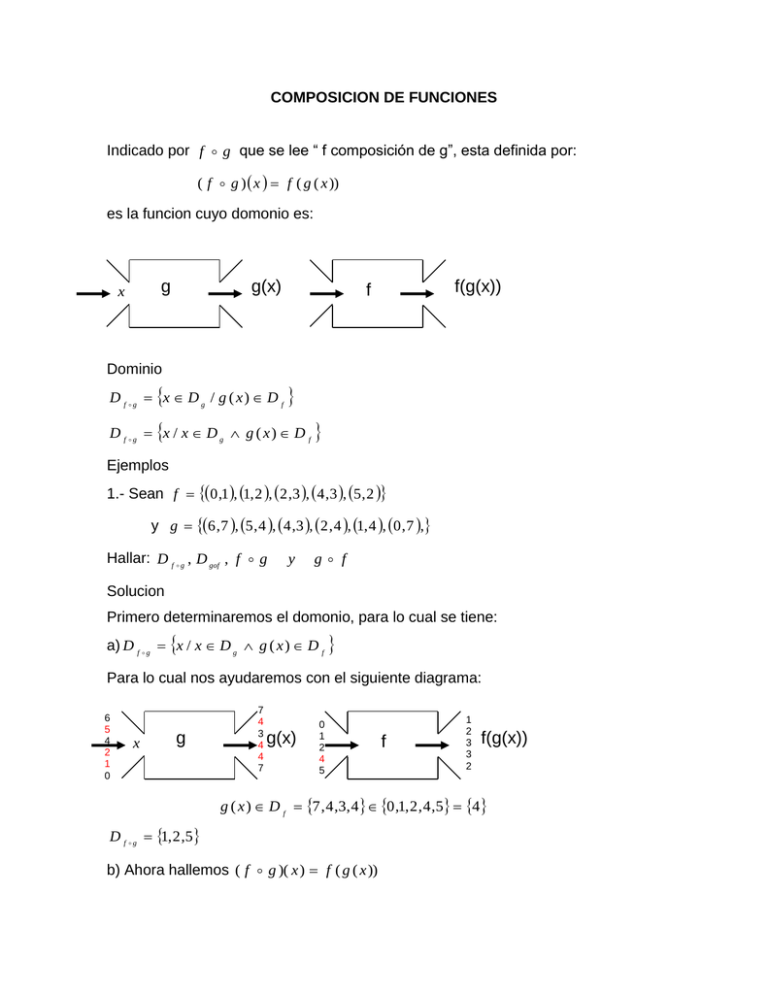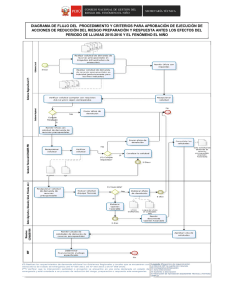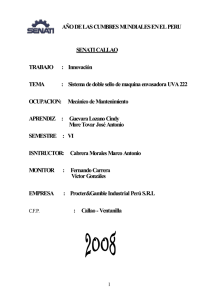Composición de funciones matemáticas
Anuncio

COMPOSICION DE FUNCIONES Indicado por f g que se lee “ f composición de g”, esta definida por: ( f g ) x f ( g ( x )) es la funcion cuyo domonio es: g x g(x) f(g(x)) f Dominio D f g x D g / g ( x ) D f D f g x / x D g g ( x ) D f Ejemplos 1.- Sean f 0 ,1 , 1, 2 , 2 ,3 , 4 ,3 , 5 , 2 y g 6 , 7 , 5 , 4 , 4 ,3 , 2 , 4 , 1, 4 , 0 , 7 , Hallar: D f g , D gof , f g g f y Solucion Primero determinaremos el domonio, para lo cual se tiene: a) D f g x / x D g g ( x ) D f Para lo cual nos ayudaremos con el siguiente diagrama: 6 5 4 2 1 0 x g D f g 1, 2 ,5 7 4 3 4 4 7 5 4 g ( x ) 21 0 0 1 2 4 5 g(x) 5 74, 4 ,3, 4 2 1 0 Df f 1 2 3 3 2 5 4 24 1 0 f(g(x)) 0 ,1, 2 , 4 ,5 b) Ahora hallemos ( f g )( x ) f ( g ( x )) donde los x 0 ,1,5 ( f g )( 0 ) f ( g ( 0 )) f (1) 4 ( f g )(1) f ( g (1)) f ( 4 ) 3 ( f g )( 5 ) f ( g ( 5 )) f ( 4 ) 3 f g 3 , 4 c) D g f x / x D f f ( x ) D g Para lo cual nos ayudaremos con el siguiente diagrama de maquina: 0 1 2x 4 5 1 2 3 3 2 f 5 4 2 1 0 f D f g 0 ,1,5 g(x) 5 4 ( x) 2 1 0 6 5 4 2 1 0 g 7 4 3 4 4 7 5 4 1,22 1 0 D g 1, 2 ,3 0 ,1, 2 , 4 ,5 g(f(x)) d) Ahora hallemos ( g f )( x ) g ( f ( x )) donde los x 0 ,1,5 ( g f )( 0 ) g ( f ( 0 )) g (1) 4 ( g f )(1) g ( f (1)) g ( 2 ) 4 ( g f )( 5 ) g ( f ( 5 )) g ( 4 ) 5 g f 4 ,5 2.- Si f y g son funciones f x x 1 2 g 2 ,3 , 4 ,5 , 1, 2 , 2 ,3 , 7 , 7 Hallar: D f g , D gof , f g y g f Solución Primero determinaremos el domonio, para lo cual se tiene: a) D f g x / x D g g ( x ) D f Para lo cual nos ayudaremos con el siguiente diagrama: 2 4 -1 -2 7 3 5 -2 3 7 g x 8 3 5 -2 7 g(x) 24 f 3 f(g(x)) 48 D f x 2 1 0 ( x 1) x 1 0 x 1 x 1 2 g ( x) D f 5 425 , 2 ,3, 7 ,1 1, 5 , 2 ,3, 7 1 0 D f g 1, 2 , 2 , 4 , 7 b) Ahora hallemos ( f g )( x ) f ( g ( x )) donde los x 1, 2 , 2 , 4 , 7 Del diagrama de maquina se tiene: f g 2 , 8 , 4 , 24 , 1, 3 , 2 , 8 , 7 , 48 c) D g f x / x D f f ( x ) D g Para lo cual nos ayudaremos con el siguiente diagrama llamado de maquina: 2 4 -1 -2 7 3 5 -2 3 7 g x 8 3 5 -2 7 g(x) 24 f 3 f(g(x)) 48 D f x 2 1 0 ( x 1) x 1 0 x 1 x 1 2 5 g ( x ) D f 425 , 2 ,3, 7 ,1 1, 5 , 2 ,3, 7 1 0 D f g 1, 2 , 2 , 4 , 7 b) Ahora hallemos ( f g )( x ) f ( g ( x )) donde los x 1, 2 , 2 , 4 , 7 Del diagrama de maquina se tiene: f g 2 , 8 , 4 , 24 , 1, 3 , 2 , 8 , 7 , 48

